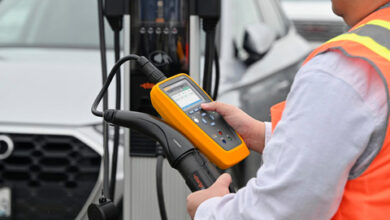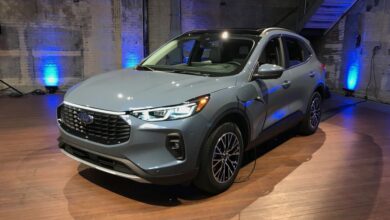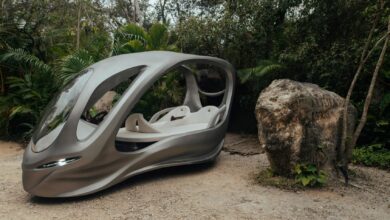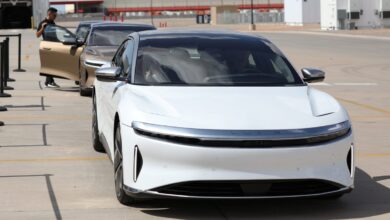Hyundai’s CMO on why company is investing in electric
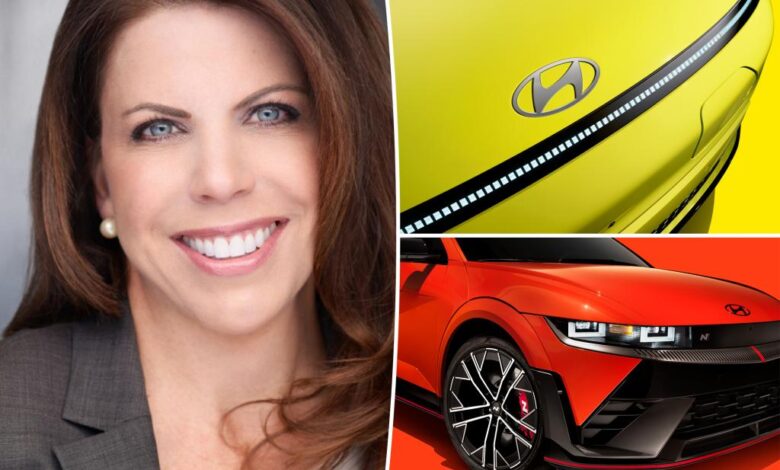
Hyundai Motor America chief marketing officer Angela Zepeda is steering the auto company towards an electrified future.
The exec, who joined the carmaker in October 2019, has been a champion of Hyundai’s aggressive push into electric vehicles, helping the brand become the second largest seller of EVs in the US, just after Tesla and the third largest automaker in the world.
Zepeda chatted with Page Six for the 2024 Cannes Lions about why Hyundai is betting big on EVs with a $28 billion investment over the next decade in production, as well as how the culture of the automotive industry is changing.
Q: Could you tell us about Hyundai’s push into electric vehicles and the decision making behind that?
Angela Zepeda: Hyundai’s commitment to EVs remain firm and we continue to execute our long-term electrification strategy that is a core part of our progress for humanity vision. We remain confident in the long-term growth of the US EV market, as demonstrated by our $12.6 billion investment in newly dedicated electric vehicle and battery manufacturing facilities in Georgia, and our continued EV sales growth – up 49% so far in 2024.
While other manufacturers are pulling back on their electrification strategy, we continue to be focused on our electrification business goals and America’s most awarded EV lineup including the IONIQ 5, IONIQ 5 N, IONIQ 6 and Kona Electric. In fact, we just launched a new national marketing campaign showcasing the design and technology benefits of Hyundai EVs, which can be viewed on Youtube.
Q: Who is the core consumer of your EVs?
AZ: While our target audience is consumers ages 21 to 44, EVs are for anyone.
As the EV market moves through a phase of transition — from early adopters to mass-market consumers — we are committed to showing the EV-curious buyer how easy the switch can be, and all the options Hyundai has to offer. No matter where our customers go in life, or what journey they are on, Hyundai makes it possible with a mobility solution.
Q: There seems to be demand among younger customers for EVs but the price point can be prohibitive. How do you bridge the gap?
AZ: Affordability is becoming more important and we’re always evaluating and adjusting our product mix to cater to demand. Our focus includes increasing trim levels aligned with consumer preferences while continuing to promote the attributes of our award-winning lineup of IONIQ 5, IONIQ 6 and best-in-class SUVs and sedans.
Increasing competition in the market and government incentives — including those in the Inflation Reduction Act in the US — will continue to put pressure on prices and bring EVs into the price range of more consumers.
EV choices are expanding. Many players are focusing on car innovation and, that is just not enough. EVs can be intimidating, and the unknown cost of electric vehicle ownership is still a barrier to adoption (rebates, charging at home, maintenance, etc.). Expanding access to EV charging and accelerating the transition to zero-emission vehicles for everyone, regardless of the kind of home or neighborhood in which they live is part of our mission, Progress for Humanity.
As e-mobility is now at a turning point and the market ramps up we have to make sure that our customers can take full advantage of the benefits of electric vehicles. Working together to build an EV infrastructure will help increase consumer interest and adoption of EVs. Hyundai has thought of everything to turn your EV transition into a lifestyle transformation. From shopping to owning an EV — Hyundai is there through every step of “the journey” to provide assurance (with exterior details, interior conveniences and intuitive tech) and ease of ownership (Hyundai Home, EVOLVE+).
Q: Hyundai has undergone a major transformation. Can you talk about when that began and how the company’s culture paved the way for that sort of innovation?
AZ: We are committed to our vision of “Progress for Humanity,” valuing mobility for human beings while ensuring minimal burden on the environment. We have a vision of how people and goods will move more sustainably, safety and more efficiently. And at the group level, we have the resources to make the right investments to make this a reality.
We firmly believe that the automobile industry has a great responsibility and opportunity to take proactive actions against climate change. From electrifying our entire line-up, to the launch of the IONIQ brand and our over 20 years of research into hydrogen technology, we have consistently led the way for change toward a more sustainable value chain. Our product lineup is a reflection of this mindset. For Hyundai, carbon neutrality and sustainability are not trends, they are a mindset and imperative for society.
Q: Hyundai has often talked about the importance of the US market. What is the strategy for the brand to continue its strong growth here?
AZ: The US is one of our most important markets, and we are pleased that we continue to see growth in EV sales.
Hyundai Motor Group is the third largest automaker in the world, the third largest in retail sales in the US, and the second in EV sales in the US just after Tesla.
So far in 2024, Hyundai EV sales are up 51% compared to the previous year. We are doubling down on electrification in the US because it is where we see the long-term growth. We are staying flexible to short term fluctuations but ultimately, we see the potential in the EV market. Sales of Hyundai electric vehicles in the US doubled year-over-year in 2023, and we are on track to meet our global target of 2 million EV sales by 2030.
Q: What’s your outlook for the US automotive industry?
AZ: EVs are the future. It’s not a question of if but when. Having said that, we have to meet customers where they are, so we continue to offer ICE [internal combustion engine] and hybrid vehicles. We are investing $28 billion over the next decade globally, boosting local production of EVs in the United States, Europe, South Korea, India and elsewhere, and we are well on our way to meeting our EV sales target of 2 million EVs by 2030. Global EV demand is growing faster than market forecasts, as evidenced by the IEA’s recent 2024 outlook on EVs, which notes that despite short term fluctuations, EV sales data remains strong.
Q: Are ad budgets coming back? What is your outlook for the ad industry, and how might the upcoming election impact that?
AZ: Economic indicators have improved and analysts are predicting that marketers in most categories will spend more on advertising in 2024 than last year — that is even excluding political advertising. Not only is digital advertising a leading driver of growth, but the retail media from e-commerce sites and digital OOH [out of home media] to apps and social platforms is expanding the network of marketing opportunities.
Load more…
{{/isDisplay}}{{#isAniviewVideo}}
{{/isAniviewVideo}}{{#isSRVideo}}
{{/isSRVideo}}
